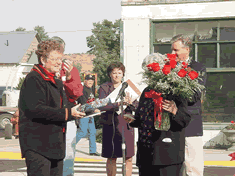Related
Article:
Oregon
is Broke And Sinking, State Treasurer Warns
Statesman Journal
Other Freauf Articles:
Seek For Sex Education And You Shall Find
The Giant
Sucking Sound
in Washington, D.C.
Is "The Giver" On Your Horizon?
Is The Chamber of Commerce an UN Front?
Oregon State Supplies Our Vices
Earth Day, May Day And Watermelons
Are We Destined For Selective Reduction?
Robbing Peter To Pay Paul In Oregon
By Betty Freauf
August 10, 2003
NewsWithViews.com
This is the tale of two tiny towns in Grant County, Washington, of which I am well acquainted: Wilson Creek and Marlin. The two towns are about seven miles apart about half way between Spokane and Wenatchee and about 50 miles south of Grand Coulee Dam. Neither of the tiny towns are on Highway 28 which runs south of both towns.
The Spokane Chronicle had an article on January 20, 1983 about the farm community of Marlin, which still remains the state's smallest incorporated city, once called Krupp but later changed. A fire in the 1930s wiped out many of the businesses so today only the Krupp Union Grain Co-op and the post office remain.
In 1983, it had a declining population of 70 people, but the state's smallest city embodies the virtues of small-town America: The streets are safe, the people are friendly and the days pass tranquilly. When a farmer experiences unexpected medical problems during harvest or perhaps dies, other farmers pull their combines into his fields to get the crops to the elevator quickly all at no cost to the family.
In 1983, the Marlin grocery was still granting its regular customers charge slips to be paid at the end of the month. In difficult times, credit was extended and Goodwill boxes appeared in the store so others could donate food.
When someone needs blood, the residents are quick to respond. This is still a community that believes in individual responsibility without any assistance from Big Brother.
One resident, mentioned in the 1983 article, was Henry Kallenberger (former school janitor, now deceased), a city councilman at the time. After donating his time to cut the lawn outside Marlin's community center, the town's former school gym, Henry parked his Craftsman tractor mower inside an old paint-peeled Baptist Church which has been converted to the City Hall. I graduated from that school in a class of three. But don't laugh. That same year Wilson Creek had a graduating class of one. We don't have class reunions. We have school reunions. The Marlin kids are now bussed to Wilson Creek to school.
With the exception of a new bridge across the little Crab Creek that runs through town, I don't remember any capital improvements in all the years I lived there or since I left 48 years ago. Its budget in 1983 was $19,000. Edna Lenz, a lifelong resident of Marlin (also deceased and sister-in-law to Henry) said in the 1983 article "Do you know that many of the people in Moses Lake, only 30 miles southwest, don't know where Marlin is?"
And Tracy Lesser in 1983 was quite possibly the youngest mayor in Washington. In 1981, at the age of 23, he ran unopposed for mayor before Marlin's 30 registered voters. Like every other community, Marlin must balance its needs against its revenues and Mayor Lesser laughs and says, "If we were to try to hire a city manager, they'd probably laugh at us with our $19,000 budget."
Others, however, believe Marlin looks like a town suffering from rigor mortis, a community in the last throes before extinction. The article quoted a school teacher from the East who once described this tiny town as a cemetery with street lights and after living there for a year and teaching in the two-story brick school, she left. But it is very common for some of those teachers to return for school reunions with fond memories to share. I saw my first grade teacher six years ago at one of these events and she remembered me!!
Perhaps this east-coast teacher returned to where crime runs rampant in the big cities, where tax and spend bureaucrats with big dreams and programs they can't afford, have literally put many near bankruptcy and let us not forget about big airplanes that fly into tall buildings killing many people while the residents of Marlin simply see it on the evening T.V. news and have no such budget concerns. In fact, I suspect Marlin is one of many small towns operating in the black while the big cities are trying to balance their bloated budgets on the backs of their already over-taxed citizens.
But if that east coast teacher would have been in Marlin in the summer of 1971, she would have been surprised to see all the long-haired, ill-mannered hippies from those "big cities" flock to Marlin for what they thought was going to be a rock music fete. When Marlin holds a "rock" festival, you'd better take it literally.
The chief financial backer of Sunrise '71 was from Bellevue, Washington (near Seattle) whose net worth, according to a news article, was $294,000. He put down $2,500 for the application for the festival. He told the county officials he expected a crowd of 30,000 to 50,000 rock music fans to attend the 2-day festival. Eleven Northwest bands were to furnish the music. He said they planned to construct 50 latrines and 100 garbage disposal pits on the piece of rocky, sagebrush-studded land and food was to be furnished by Moses Lake and Seattle concessionaires.
The county commissioners ended up rejecting the permit warning "all concerned to refrain from coming to Grant County due to extensive heat possibilities, pests and rattlesnakes which could make attendance extremely hazardous." A picture of a nine year-old (my brother's step daughter) was featured in a June 1973 article holding a 3' 9" rattlesnake which my brother had shot. It was estimated the snake may have been one of the largest ever found in the area of Marlin and may have been curled up under one of those rocks just waiting for a bite of one of those festival attendees.
But like many city slickers, who believe little towns like Marlin have a McDonalds and a service station on every corner, many came because they had not heard the festival had been canceled. The little peaceful town of Marlin was soon rocking with many unruly, uninvited visitors. The only gas pump was private and it sat in my folks' front yard and my parents were inundated with requests for gas. Eventually the 250 law officers from 15 different county sheriff's departments and 14 city police departments got the Marlin crowd disseminated but the fans were then shuttled from place to place causing more havoc in other areas.
With the exception of the fire in the 1930s and a Krupp Union Grain Elevator fire in 1953, a house fire now and then and a few people getting killed on the railroad track or in farm accidents, this has been the extent of Marlin's excitement.
In the meantime, the little town of Wilson Creek, to the best of my recollection, never got such publicity until the counterpart to Matthew Lesko became mayor. You all remember Lesko? He wears a funny suit with question marks all over it and he advertises his book on how to get freebies from the federal government.
A 7/29/2003 article in the Spokesman Review says: Town Finds a Grant for Nearly Every Wish because Mayor Kathy Bohnet knows how to write grant applications. Figuring if these "freebies" are available, her little town of Wilson Creek is as deserving as any and she affectionately pats her fax machine and says "I got a grant for this" as well as a computer and other office technology from the Association of Washington Cities.
The historic bank building purchased during the reign of her predecessor had its crumbling interior restored under a project spearheaded by Kathy and is now the museum. Townsfolk and federal Jobs Corps crews did the work. The bank was built during the days of outhouses so the work included building a septic system and installing plumbing. One couple paid for carpeting and Mayor Kathy convinced Grant County to waive some $400 in permit fees and won $1,000 in state historic preservation money for some materials. With the project done, reports the Spokesman Review, Bohnet asked the Grant County sheriff what it would take to get more police presence in town. The result: a "cop shop" in the old bank where deputies come any time to do paperwork.
 Grants have paid for the pavement out front, the
shade trees, and the $60,000 in state money for vintage street lamps.
The state's Family Policy Council paid $1,200 for the sidewalk flower
pots. Kathy supplies the flowers from her own greenhouse and she painstakingly
waters them daily with a water tank built on her riding lawn mower.
Grants have paid for the pavement out front, the
shade trees, and the $60,000 in state money for vintage street lamps.
The state's Family Policy Council paid $1,200 for the sidewalk flower
pots. Kathy supplies the flowers from her own greenhouse and she painstakingly
waters them daily with a water tank built on her riding lawn mower.
Kathy's predecessor also had overseen reconstruction of the town water system, done with state grants at a cost of more than $1 million and had won a $400,000 grant from the state Department of Transportation to repave 1-1/2 miles of streets, build some new sidewalks and replace others but Bohnet applied for more.
While many government entities have paid grant writers on staff, this $75 monthly salaried mayor spent hours writing and then having to re-write the application to meet the Interagency Committee for Outdoor Recreation's specifications for the $35,000 skate park soon to become a reality.
She convinced the county transit authority to run summer buses twice-weekly on a new nonstop summer route that delivers the kids to the water park in Ephrata, 30 miles to the west. They also get immunizations at the town hall, rather than driving 30 miles to Moses Lake.
Crews from the federal Job Corps program rebuilt the picnic shelter, made the restroom wheelchair accessible, painted and did other work in the town park.
 Mayor Bohnet has a million-dollar attitude that
is fueling Wilson Creek's pride. In all, Wilson Creek, with a population
of 242, has received more than $1 million in various grants over the past
five years, that for a town whose annual budget is about $100,000.
Mayor Bohnet has a million-dollar attitude that
is fueling Wilson Creek's pride. In all, Wilson Creek, with a population
of 242, has received more than $1 million in various grants over the past
five years, that for a town whose annual budget is about $100,000.
The article says Wilson Creek hit its peak of 400 people in 1910 but is down to three businesses today. But people from those big cities looking for a quiet place to retire are taking a second look at Wilson Creek. One resident said five years ago you couldn't sell a house but today there are few available homes because people are moving from the big cities to quiet Wilson Creek.
When the Bohnet family moved from the farm two miles north of Wilson Creek, they bought one of those very old Victorian two-story homes and Kathy lovingly restored and appropriately furnished it. And she loves a beautiful yard and has an abundance of lawn and flowers surrounding the home.
 In 1997 she won the Grant County Fair's Master Gardener
award. She also served on the cemetery commission and now Wilson Creek's
cemetery is among the nicest in the area. She also served a stint on the
school board. The superintendent and principal of the Wilson Creek school
says "She's one of those ladies that just goes out and bird dogs."
In 1997 she won the Grant County Fair's Master Gardener
award. She also served on the cemetery commission and now Wilson Creek's
cemetery is among the nicest in the area. She also served a stint on the
school board. The superintendent and principal of the Wilson Creek school
says "She's one of those ladies that just goes out and bird dogs."
Kathy grew up in a family of ten. Her parents were both teachers but her mother decided it would be better to stay home and raise the kids, reports an April 2000 article profiling Mayor Kathy. So her father became the main breadwinner. He taught history at Yakima High School and she remembers feeling out of place in their middle-class neighborhood. Although her parents could afford to live there, they didn't have much extra for some of the nice things their neighbors had.
However, that changed when at age 13 her father won a Ford Foundation Fellowship that allowed him to take a one-year paid sabbatical. He chose to spend a school year sitting in on lectures at the Woodrow Wilson School of Foreign Affairs in Princeton, New Jersey while taking side trips with his family to every historic site he could on the east coast. Kathy figures inasmuch as her father was particularly interested in Revolutionary war sites, "I've probably seen every cannon that ever fired a shot in the Revolutionary War." The cost of public transportation was prohibitive for such a large family to travel so they camped their way across the country to New Jersey. During that year, Kathy and her siblings enrolled in Princeton schools where they attended classes along with children of some of the best and brightest scholars and statesmen in America.
In 1960, she married my cousin, Harvey Bohnet, a dry land wheat farmer just like his father and his grandfather. They are the parents of two boys and two girls. The youngest boy and girl are twins. The girl attended Hillary Clinton's alma mater, Wellesley College. The oldest boy is now on the farm.
To attract tourists to their cities, towns offer a variety of events. Fruita, California, for instance, honors a chicken who lived for 1-1/2 years after having its head chopped off. Huntington, Indiana, has a Dan Quayle Museum. Olney, Illinois, calls itself the "White Squirrel Capitol". Chatoonga, Tennessee, has a "Tow Truck Museum". Wilson Creek? Well, this tiny town has an annual plowing days contest in March with horses, mules and anything else with four legs.
 So, while Wilson Creek has recently been given an
achievement award for town improvements by the Association of Washington
Cities, Marlin's only distinction remains the smallest incorporated city
in Washington still operating on a voluntary basis and no grant money.
But inasmuch as the two towns have long been rivals, I can't help but
wonder if the wheel's in the Marlin mayor's head aren't beginning to turn.
Perhaps one of these days we'll see a sign in Marlin that says, "Open
for business."
So, while Wilson Creek has recently been given an
achievement award for town improvements by the Association of Washington
Cities, Marlin's only distinction remains the smallest incorporated city
in Washington still operating on a voluntary basis and no grant money.
But inasmuch as the two towns have long been rivals, I can't help but
wonder if the wheel's in the Marlin mayor's head aren't beginning to turn.
Perhaps one of these days we'll see a sign in Marlin that says, "Open
for business."
But Marlin does have something new in town. A recent newspaper article sent to me shows a flower garden built by volunteers, as a tribute to the former long-time City Clerk and manager of the Krupp Union Grain Co-op, Jim Friend, now deceased. Ironically, Jim was formerly from Wilson Creek. It sits outside the Marlin fire station (manned by volunteers) with an American Eagle perched on top of a sign that says, GOD BLESS AMERICA. In the background is a gas pump whose meter shows gas cost at 42.9 cents per gallon when gas was last pumped.
And this the two towns most certainly have in common and I'm sure Mayor Bohnet agrees: GOD BLESS AMERICA.
� 2003 Betty Freauf - All Rights Reserved
Sign
Up For Free E-Mail Alerts
Betty is a former Oregon Republican Party activist having served as state party secretary, county chairman, 5th congressional vice chairman and then elected chairman, and a precinct worker for many years. Betty is a researcher, freelance journalist and a regular contributer to http://www,NewsWithViews.com. E-Mail: bettyfreauf@webtv.com
"In the meantime, the little town of Wilson Creek, to the best of my recollection, never got such publicity until the counterpart to Matthew Lesko became mayor. You all remember Lesko? He wears a funny suit with question marks all over it and he advertises his book on how to get freebies from the federal government."




